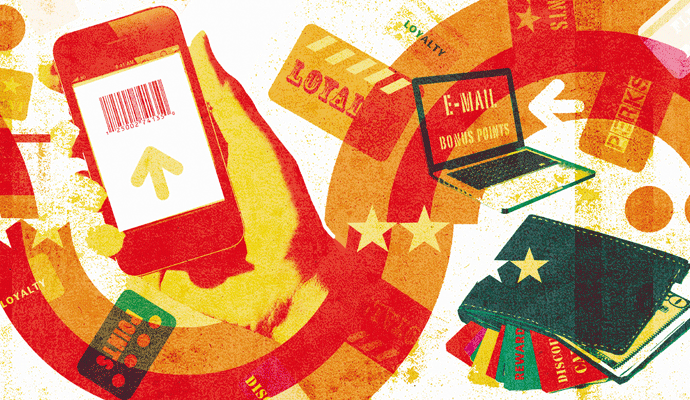Is Tech Eroding Consumer Loyalty?
In many categories, the value of brands may be in decline.
When Jonney Shih started talking about selling laptops under the Asus brand, it didn’t raise too much concern among established players in the PC industry. Shih is the chairman of ASUSTeK Computer Inc. (known simply as Asus), a Taiwanese company that was a contract manufacturer of notebook computers and game consoles. Although Asus was well respected among industry insiders, few consumers were aware of its existence. Conventional wisdom holds that you need to build a trusted brand in order to get people to open their wallets, and establishing a brand is notoriously expensive. Friends and colleagues warned Shih that he wouldn’t get far without brand awareness, name recognition, and heavy advertising.
Yet by 2013, it was clear they were wrong. In 2012, Asus reached fifth place in worldwide PC sales, experiencing prominent growth even as overall industry shipments declined. In the first quarter of 2013, Asus reached the number three position in worldwide tablet shipments, according to IDC.
A Shift in Consumer Behavior
How could a company be so successful with almost no initial brand awareness? Shih, and the US$15 billion company that he heads, have benefited from a fundamental shift in the way consumers evaluate and purchase products and services. Consumers used to make these decisions relative to other things—a brand name, a list price, or their own past experience with a company. But today, consumers are basing more and more decisions on the absolute value of things.
Relative evaluations are based on comparisons with whatever happens to be most prominent, or placed in front of you on a store shelf or a catalog page. But absolute evaluations go beyond those constraints to use the most relevant information available about each product and feature, and they usually produce better answers.
A technological revolution is driving this shift, as various new tools help us assess the quality of products and services we’re considering. Aggregation tools, advanced search engines, reviews from other users, social media, unprecedented access to experts, and other emerging technologies—these things enable consumers to make better decisions without having to rely on relative evaluations.
To be clear, the term absolute value doesn’t mean the absolute best option (assuming that an absolute best option even exists). Instead, it means a “good enough” solution, which can vary depending on the individual and his or her subjective tastes. The point is that today people can more easily determine the absolute value of something to them—and get closer to knowing what their experience will be with an individual product.
Here’s one way that Asus benefits from the shift away from relative evaluations. In the old days, consumers used their own past experience with a brand as a key quality proxy. When Jane was thinking of buying a new laptop, the most accessible piece of information might have been in her memory: “In the past, I used a Dell laptop that worked fine.” This was an easy reference point to use, and it led Jane to conclude that the new Dell models on the market must be good too. Some of this way of thinking will continue, of course, but today Jane can go online and easily find out much better information about any model made by Dell, HP, Asus, or any other company. When quality can be quickly assessed, people are less hesitant to try something new, which means that newcomers like Asus can enjoy lower barriers to entry.
Through the 20th century, the practice of marketing was largely intended to communicate values relative to reference points. But what would happen if one morning consumers woke up and were suddenly able to assess absolute values?
Planet Absolute
Let’s imagine a planet—we’ll call it planet Absolute—that is almost identical to planet Earth. There’s only one difference: Before you buy something on planet Absolute, you press a magic button and know everything you want to know about it—you know exactly how good or bad that product or service is going to be, and how you will like it after using it. Economists would call this “perfect information.”
How would people make decisions on planet Absolute?
They wouldn’t rely on a brand to determine the quality of a product. They would just press the button. They would not be too impressed by the fact that a product is made in Germany or any country with a reputation for quality. They would just press the button. They wouldn’t care as much about the fact that they loved the last model from the same company. When a consumer shopped for a car on planet Absolute, he or she would not need indirect proxies to assess the likely experience with a specific model. Although the consumer might still be influenced by image and status, he or she would not need a brand name to assess the car’s quality.
A state of perfect information is, of course, theoretical, and we obviously will never reach the hypothetical planet Absolute. But in more and more areas of life, we’re starting to get closer to absolute values, which make us less dependent on relative evaluations. The human brain is not changing, but a fundamental shift in our information environment is under way, with far-reaching, evolving implications for consumer decision making.
A shift in our information environment is under way, with far-reaching implications for marketers.
Today, review sites (whether Amazon or CNET, Yelp or Zagat) tell us about the reliability and usefulness of products, and help us predict the experience we can expect at restaurants or hotels. Through social media, it’s become almost effortless to get recommendations from friends and acquaintances. Post a question on Facebook or Twitter (“Can anyone recommend a camera?”) and you’re likely to get personalized advice from an expert in your own network. Use Facebook’s Graph Search to find out what your friends (or their friends) say about a particular restaurant or movie. Assessing value and price has become much easier too: Mobile apps such as Decide.com, ShopSavvy, and Bakodo inform us about the resale values of products.
In fact, people already use—and trust—these tools. Consider these three facts:
• In 2012, 70 percent of consumers surveyed by Nielsen indicated that they trusted online reviews—which represents an increase of 15 percent in four years.
• Thirty percent of U.S. consumers start their online purchase research with Amazon, which, with its wealth of reviews, is a clearinghouse for product information.
• Research done for Google in 2011 found that the average shopper consults 10.4 information sources prior to purchase—almost twice as many as in 2010.
Research done in 2011 found that the average shopper consults 10.4 information sources prior to purchase.
Two issues are worth addressing here. First, can these technologies be manipulated? No doubt some companies try (and always will) to game the system—for example, by planting positive reviews. Yet despite alarming articles that pop up periodically in the press about fake reviews, paid bloggers, fake “likes," or other schemes, manipulators usually have limited impact, and their effectiveness will decline as rating systems find better ways to deal with them. Reviews are not perfect, but one solution that consumers are not turning to is trusting marketers as the main source for information regarding quality.
The second issue: Is the wealth of information creating tremendous clutter that makes decision making even more difficult? Many observers use this concept to support their belief that brands and loyalty are more important than ever. Yet the Web provides effective tools for sorting and using the most relevant information. In most real-world buying situations, options are already well sorted. And with the steady improvement in information and sorting tools, the overload problem will become even less significant.
The cumulative effects of these technologies, and their dramatic impacts on how consumers make decisions, pose a major challenge to established ideas about marketing and related business functions. Simply put, they make influencing consumers through relative tactics and cues, such as brand and price, much harder.
Is this the end of brands? Of course not. Brands still play some important roles that are not likely to go away. And in categories where prestige, status, and emotional links to brands matter a great deal, the rate of change is likely to be slow. So luxury brands (such as Louis Vuitton and Hermès) are on safer ground. Yet in domains where objective, specification-based quality is important—and can be assessed and communicated—even prestigious brands are not immune.
The implications for consumers and businesses are enormous. First, the new reliance on absolute value means that, on average, consumers will tend to make better decisions and become less susceptible to context or framing manipulations. For businesses, it means that marketing is changing forever. ![]()
Reprint No. 00247
Author profiles:
- Itamar Simonson is the Sebastian S. Kresge Professor of Marketing at the Graduate School of Business at Stanford University.
- Emanuel Rosen is the author of The Anatomy of Buzz: How to Create Word-of-Mouth Marketing (Currency Doubleday, 2000). Previously, he was vice president of marketing at Niles Software. He’s @EmanuelRosen on Twitter.
- This article is adapted from Absolute Value: What Really Influences Customers in the Age of (Nearly) Perfect Information (HarperBusiness, 2014).




